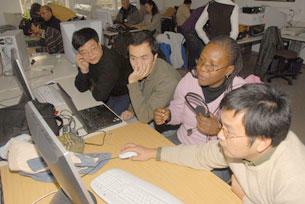The "GeoLearning" project
Networkpartners
The partners of the interdisciplinary project "GeoLearning" are
- project leaders and managers of the Department of Geology and the Department of Geography at Freie Universität Berlin
- 27 earth science educators from Latin America, Africa and Asia (mostly DAAD alumni and alumnae from Argentina, Chile, Peru, Ecuador, Cuba, Tunisia, Niger, Cameroon, Kenya, Ethiopia, Sudan, Uganda, Botswana, Mongolia, China, Taiwan, Vietnam …).
During the three years of the project the contributors met for three workshops in Berlin.
Concept of the project
The concept of the two-week winter schools included a mix of plenary sessions and project-oriented groupwork:
- In the plenary sessions experts introduced the participants to didactical, technical, organisational and legal aspects of e-learning, followed by discussions.
- In the practical work the participants were trained in skills and techniques to develop their own e-learning materials. In five thematic groups the participants jointly created an e-learning environment using the FU Berlin's Content Management System. Each group could call on the support of a tutor and e-learning experts of the Department of Earth Sciences. The output of the groupwork is this GeoLearning environment for shared use among the contributors and their institutions.
We hope that lecturers and students of the Geosciences, Environmental Sciences and other interested people will also benefit from this e-learning material.
You will find more information about the project and the programmes of each conference on our web presence of the winter school 2006-2008.
Outlook
This international networking project was very inspiring for all the contributors discussing innovative methods of (e-)learning and teaching as well as the newest developments in the different scientific areas. The participants expressed great interest in starting regional networks and follow-up projects to continue capacity building in e-learning in their countries with a focus on a south-south cooperation (multiplier effect).
Thanks
We would like to thank
- especially the DAAD for funding the project and
- the numerous contributors for their outstanding collaboration, especially the external speakers, the CeDiS and the colleagues of our Department of Earth Sciences.
